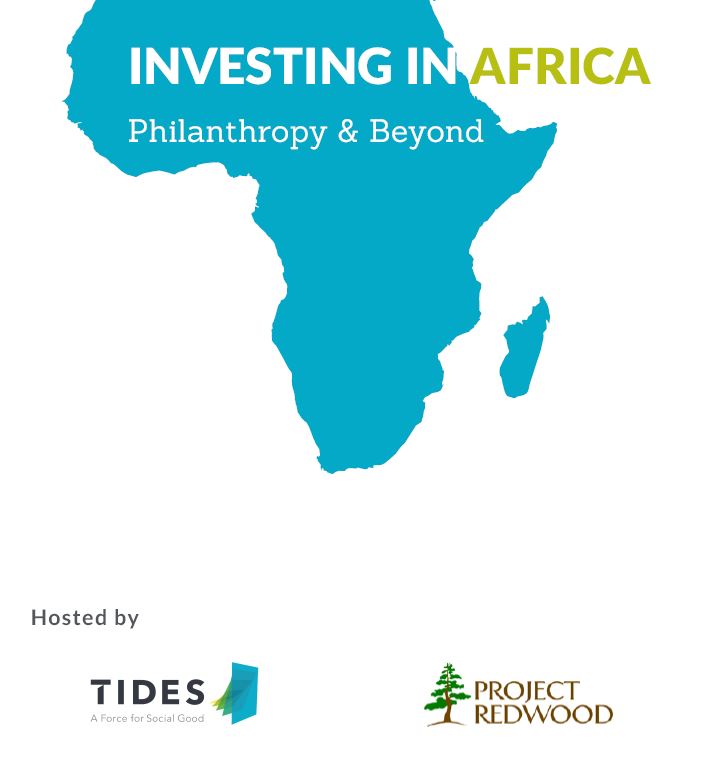 Program for the 2017 Africa Forum co-sponsored by
Program for the 2017 Africa Forum co-sponsored by
Project Redwood and TidesProject Redwood was first imagined in 2005, at the 25th reunion of the Stanford Business school Class of 1980, as a way to give back for the good fortune the class had experienced since their years at the business school. The founding committee led by Carol Head and Ed Kaufman agreed on a global focus for Project Redwood. They wanted a way to start working quickly on the stated goal of measurably reducing extreme poverty.The committee determined that an expedient way to get up and running, prove Project Redwood’s founding concept, and start making a difference, was to find an organization to help PRW establish best practices, collect donations, provide tax deductibility for donors, vet grant candidates and provide a formal grant structure.Early in the process, Project Redwood was fortunate to benefit from the power of personal relationships. One of the founders, Beth Sawi, had served on the board of the Levi Strauss Foundation with Judy Belk, who then moved to Rockefeller Philanthropy Advisors (RPA). This relationship provided our introduction to RPA.In the meantime, a committee led by Mike Watt investigated opportunities with Community Foundations in northern California (Marin County, San Francisco and Peninsula), but found that Community Foundations are focused on their local areas and their infrastructures were set up to receive donations from individuals rather than groups.Rockefeller Philanthropy Advisors, however, saw a match between Project Redwood and their work with what they called “sponsored projects.” The relationship would provide Project Redwood with:
- Quick setup
- Low cost
- Low maintenance
- Umbrella 501-c3 status and tax filing as a charitable organization
- The prestige of the Rockefeller name
RPA responded to Project Redwood’s October 2006 Request for Proposals, emerged as the best choice, and by December 6 agreements were signed and Project Redwood was up and running as a sponsored project of RPA.For the next ten years, the relationship with Rockefeller Philanthropy Advisors met its goals of providing PRW a reliable and widely recognized partner in collecting money from donors, providing final vetting of grantees and dispensing grant monies.However, by Spring of 2015, especially in light of the Legacy Review, we determined that our experience with RPA had not provided the synergies with other non-profits and possible clients that PRW had hoped for. At the same time, RPA had expressed an interest in supporting larger organizations and said it would not renew our contract when it was scheduled to expire on December 31, 2015.Thus, PRW had 6 months to decide whether to incorporate as a stand-alone not-for-profit corporation or to find another partner. To begin the transition, Donna Allen, Ken Inadomi, Amy Minella, Ann Thoke Espy, Phyllis Owens and Mike Watt brainstormed a list of potential partner candidates from their own experience and references. They reviewed the Silicon Valley Foundation (the successor to the Peninsula Community Foundation), Marin Foundation, Third Sector in New England, FJC in New York and, at the suggestion of folks at RPA, Tides Foundation. The organizations were compared using criteria based on our experience with RPA, which would serve as the “control” in the comparison.The criteria used in comparing the organizations included:
- Compatibility with PRW’s mission
- International experience
- Cost
- Ability to maintain and promote PRW’s brand
- Capacity to handle online donations, acknowledgments and payments to grantees
- Ability to umbrella PRW with its 501c-3 status including tax acknowledgments to donors.
The short list of candidates included The Silicon Valley Community Foundation and Tides.The Silicon Valley Community Foundation, typical of Community Foundations, gathers contributions from community members, however that community is defined and supports charitable projects usually throughout that same community. The wealth of Silicon Valley donors and the Foundation’s resulting pool of funds has allowed it to go beyond the borders of Silicon Valley and support projects around the world, including sponsored projects such as Project Redwood.Tides, founded in 1976, sponsors “collective action funds” such as Project Redwood as one of the main categories of their work. Other supported entities include foundations, individuals and corporate partners.The committee eventually recommended Tides Foundation to the Board, based on their fulfillment of the criteria but especially
- Deep and broad experience with international philanthropy
- Its understanding of and “fit” with our mission
- More staff dedicated to PRW’s management including a dedicated financial person
- Local means to connect with other fund advisers.
- The presence of other Stanford alums on its staff, particularly Kriss Deiglmeir, CEO, founding Executive Director of Stanford’s Center for Social Innovation and advisor to the Stanford Institute for Innovation.
The transition to Tides was complete, well before the deadline, by October 1, 2015.An example of the synergy fostered by Tides is the Africa Forum jointly sponsored by Tides and Project Redwood, which brought together a number of other funders of projects in Africa and helped PRW build connections that have proved valuable. Tides also provided the venue for Project Redwood’s annual meeting last October. The one-day Africa Forum included representatives of both Project Redwood grantees and other Tides sponsorees. In both plenary sessions and breakout groups, attendees heard about topics as diverse as empathy and deep listening as development tools, game-changing investments for scale, and mobile as a catalyst and ecosystem for change, all through the lens of ongoing philanthropy in Africa.As we enter our fourth grant-making season with Tides, they are demonstrating synergy and partnerships that should serve Project Redwood well whatever transitions our Legacy Review brings us.
